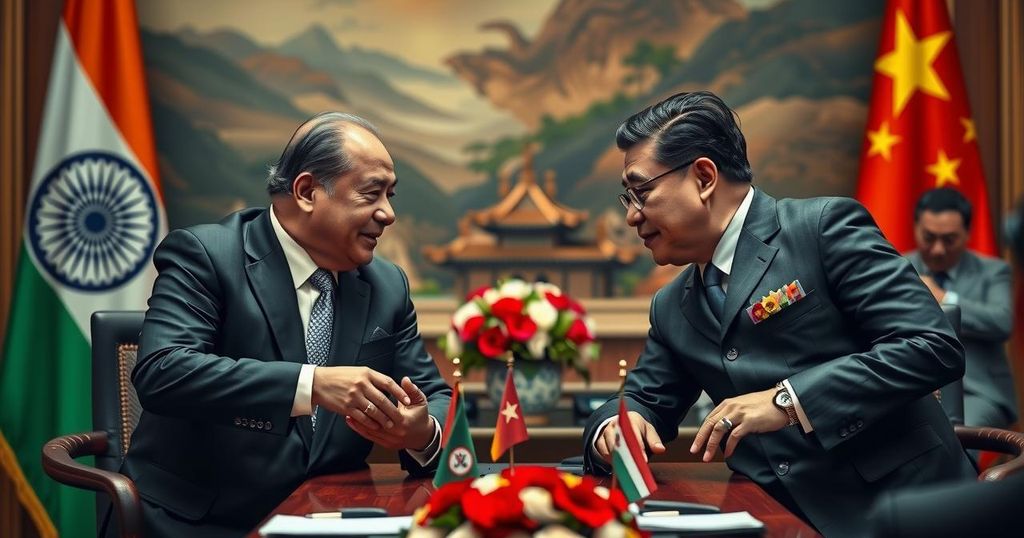During the BRICS summit, Indian Prime Minister Narendra Modi and Chinese President Xi Jinping held their first full-fledged dialogue in five years, signaling a potential thaw in tensions following a tumultuous period marked by border clashes in 2020. An agreement was reached for troop disengagement along their disputed frontier, which may reshape geopolitical alliances in Asia. However, significant questions about territorial disputes and economic relations, compounded by India’s previous measures against Chinese investments, linger as uncertainties in this diplomatic endeavor.
At the recent BRICS summit in Kazan, Russia, a notable development occurred as Indian Prime Minister Narendra Modi and Chinese President Xi Jinping engaged in their first comprehensive bilateral dialogue in five years. This meeting comes in the context of a tentative agreement for troop disengagement along the disputed India-China border, following a series of clashes, most notably in 2020. The dispute previously claimed the lives of at least 20 Indian soldiers and four Chinese troops, marking a significant strain in the bilateral relationship which has persisted since that time. During the summit, Indian Foreign Secretary Vikram Misri disclosed an agreement on troop disengagement, permitting both nations to recommence patrolling under an established schedule. Analysts suggest that this detente signifies a critical geopolitical shift, as India appears to be distancing itself from US strategic plans, particularly in light of growing concerns over China’s assertiveness in the region. Experts like Zorawar Daulat Singh assert that this change reflects a broader intent on India’s part to recalibrate its approach to foreign relations. Nevertheless, uncertainties remain regarding the specifics of the border agreement, particularly concerning territorial disputes and military presence along the Line of Actual Control (LAC). Reports highlight that China may have encroached on areas previously controlled by India, raising questions about the commitments made by both sides in the agreement. Major-General Hemant Kumar Singh voiced reservations about whether India had regained lost territory, emphasizing the need for transparency regarding these negotiations. Beyond military dynamics, the future of economic relations looms large. Since the 2020 clash, India has taken measures to reduce Chinese investment and influence, including banning several Chinese apps and excluding Chinese technology firms from 5G trials. However, with foreign direct investment in India declining, there is mounting pressure to reconsider these restrictions. Business leaders advocate for attracting Chinese investments, particularly in sectors beneficial for India’s economic growth, such as renewable energy. The implications of this agreement extend beyond bilateral ties, as it may signal to Western nations that India is pursuing a more independent path amidst pressure from the United States. However, India’s strategic concerns regarding China will likely persist and complicate their relationship moving forward, as articulated by strategic analysts like Anil Trigunayat.
The relations between India and China have historically been marred by border disputes, most notably the 1962 Sino-Indian War and recent border confrontations leading to casualties in 2020. The BRICS summit served as an unexpected opportunity for dialogue between Xi Jinping and Narendra Modi, aimed at addressing these prolonged tensions. The increase of military presence on both sides of the LAC following these incidents has heightened fears of a potential conflict. The significant geopolitical context involves the India-US partnership, especially regarding shared concerns over China’s regional hegemony and expansionist policies. As India balances its strategic engagements with major global powers, managing its relationship with China remains critical, especially amid calls for economic collaboration and investment opportunities that could benefit its economy.
In summary, the recent meeting between Modi and Xi marks a pivotal step towards resetting Indo-China relations after a prolonged period of tension stemming from border conflicts. While the agreement for troop disengagement is a positive development, significant uncertainties regarding territorial integrity and economic relations remain. Analysts are hopeful for constructive engagement, yet the complexities of Sino-Indian ties, compounded by strategic considerations from broader international dynamics, will likely challenge this cooperation moving forward.
Original Source: www.aljazeera.com






